|

 |
Twenty-Fourth sessions of the
Subsidiary Body for Scientific and Technological Advice (SBSTA)
and the Subsidiary Body for Implementation (SBI) of the UNFCCC
and First session of the Ad Hoc Working Group on Further
Commitments for Annex I Parties under the Kyoto Protocol (AWG)
and related meetings
|
 |
|
|
Highlights for
Monday, 15 May 2006
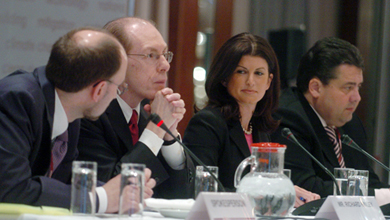
|
The twenty-fourth sessions of the Subsidiary Bodies (SB 24) of the United Nations Framework Convention on Climate Change (UNFCCC) are taking place from 18-26 May 2005, at the Maritim Hotel in Bonn, Germany. SB 24 will follow a UNFCCC "Dialogue on long-term cooperative action to address climate change by enhancing implementation of the Convention," being held from 15-16 May. In addition, the first session of the Ad Hoc Working Group on Further Commitments for Annex I Parties under the Kyoto Protocol will take place in parallel with SB 24, from 17-25 May. Both the UNFCCC Dialogue and the Ad Hoc Working Group under the Kyoto Protocol are being held as a result of decisions taken during the eleventh Conference of the Parties (COP 11) to the UNFCCC and first Conference of the Parties serving as the Meeting of the Parties to the Kyoto Protocol (COP/MOP 1) in Montreal in late 2005. At COP 11 and COP/MOP 1, delegates adopted a number of decisions to engage in discussions for considering a framework for the post-2012 period (when the Kyoto Protocol's first commitment period ends) and long-term cooperative action on climate change.
At SB 24, the Subsidiary Body for Implementation (SBI) will take up such issues as national communications, financial and administrative matters, capacity building, and amendment of the Protocol in relation to the compliance mechanism. The Subsidiary Body for Scientific and Technological Advice (SBSTA) will consider a range of issues, including the five-year work programme on adaptation, mitigation, technology transfer, reducing emissions from deforestation in developing countries, and a range of methodological issues under both the UNFCCC and the Kyoto Protocol. Both SBI and SBSTA are expected to produce a number of draft decisions to be forwarded to COP 12 and COP/MOP 2, which will take place in November 2006 in Nairobi, Kenya. More information. |
| Dialogue on long-term cooperative action to address climate change by enhancing implementation of the Convention |
| Sigmar Gabriel, Federal Minister for the Environment, Nature Conservation and Nuclear Safety, Germany, drew attention to discussions at the recent 14 th session of the Commission on Sustainable Development, which had highlighted that over 1.6 billion people still lack proper access to energy, and the need to support developing countries to use environmentally-friendly energy. He identified the CDM as a good example of North-South cooperation, stressed that recent fluctuations in carbon markets will not affect the market's importance and viability, and emphasized the EU's goal of restricting climate change to 2 o Celsius or less. |
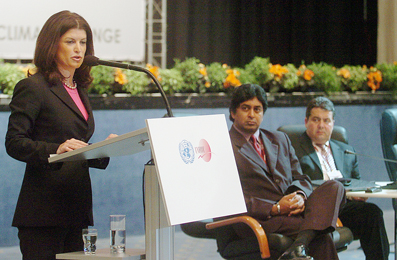 |
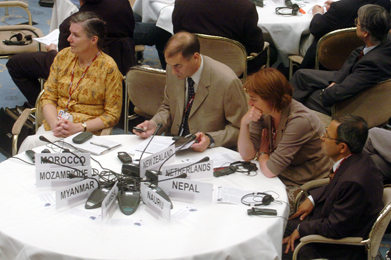 |
| Rona Ambrose, Canada 's Environment Minister
and President of COP 11 and COP/MOP 1, emphasized climate change impacts in Canada 's Arctic regions. She said that future international cooperation has the possibility of doing more than just reducing greenhouse gas emissions, such as also ensuring cleaner air and improved human health. She underlined the need for a global approach focusing on adaptation, technology and policy instruments, and stressed that all parties must be involved. |
| Co-Facilitators Sandea de Wet, South Africa, and Howard Bamsey, Australia |
| Austria, on behalf of the EU, underscored the 2 degrees C temperature target, noting that that a decrease in emissions of 15-50% was required by 2050. He stressed that acceleration of climate change could render adaptation impossible in some cases, and said developed nations should continue to take the lead. Noting that Annex I parties cannot fight climate change alone, he urged discussion on how to achieve the Millennium Development Goals while following a low carbon emission path. |
| South Africa stressed the principle of common but differentiated responsibilities, urged improved organization and consolidation of existing work programmes, and highlighted the notion of “positive incentives” to encourage and support action in developing countries across a range of activities. She stressed the value of sustainable development policies and measures, the need for increased technology research and transfer, and the need for an SBI programme of work on adaptation. |
| Khalid Mohammed Abuleif, Saudi Arabia, said that whether climate change is occurring or not is irrelevant to the UNFCCC, since it is based on the precautionary principle. He said Annex I countries have not taken the lead. Slovenia said a clear goal and decision on how to implement the UNFCCC fully is needed. |
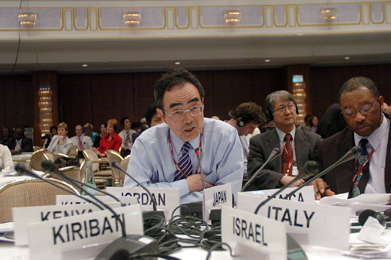 |
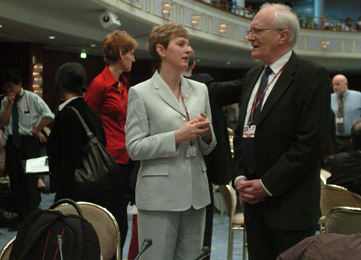 |
| Japan (left) stressed the need to focus on greenhouse gas stabilization and for engagement of all major emitters. He called for pragmatic approaches, underscored technology for energy efficiency and urged “solidarity.” Noting that the world today is different than it was in 1992 when the UNFCCC was agreed, he asked how long the “divide” in how countries address climate change can be maintained. Harald Dovand, Norway (right), underscored the critical importance of an effective and appropriate international response to climate change. He favored a broad approach to the discussions, as climate change relates to many issues, and suggested inviting think tanks as well governments to provide pre-meeting submissions and inputs. |
| Richard Kinley, Canadian Environment Minister Rona Ambrose and German Environment Minister Sigmar Gabriel |
|
|